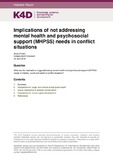| dc.contributor.author | Orrnert, Anna | |
| dc.date.accessioned | 2019-05-14T14:30:20Z | |
| dc.date.available | 2019-05-14T14:30:20Z | |
| dc.date.issued | 2019-04-30 | |
| dc.identifier.citation | Orrnert, A. (2019). Implications of not addressing MHPSS needs in conflict situations. K4D Helpdesk Report 582. Brighton, UK: Institute of Development Studies | en |
| dc.identifier.uri | https://opendocs.ids.ac.uk/opendocs/handle/20.500.12413/14493 | |
| dc.description.abstract | This review examines the potential implications of not addressing mental health and psychosocial support (MHPSS) needs resulting from conflict throughout the life course, including on longer term mental and physical health, communities and families (including intergenerational effects) and overall human development (including education and participation in the workforce). The review of existing literature indicates that there are a number of significant implications of not addressing the MHPSS needs of children, youth, and adults in conflict settings. Children are particularly vulnerable to the negative effects of conflict. Mental disorders resulting from war-related trauma can hamper development and lead to decreased functioning in adulthood. Launched in 2016, the Sustainable Development Goals (SDGs), reflect the recognition by the global development community of the significance of mental health problems, particularly in childhood or youth, as leading causes of problems throughout the life course. The SDGs acknowledge mental health and wellbeing as key components of overall health and aim to reduce children’s exposure to violence and other adversities. Historically, researchers in humanitarian settings have focused on the impact of armed conflict on mental health at the individual level as well as on identifying rates of post-traumatic stress disorder and other mental health disorders. War related trauma has been a key outcome of interest. Traumatisation is understood to lead to depression, shame, withdrawal and aggression, sleep problems, disturbed plan and psychological symptoms. Limited attention has however been paid to the psychological impact of daily stressors, that is, the persistently stressful conditions of daily life that are caused or exacerbated by armed conflict for example poverty, socio-economic adversity and social exclusion. | en |
| dc.language.iso | en | en |
| dc.publisher | IDS | en |
| dc.relation.ispartofseries | K4D Helpdesk Report;582 | |
| dc.rights.uri | https://www.nationalarchives.gov.uk/doc/open-government-licence/version/3/ | en |
| dc.subject | Children and Youth | en |
| dc.subject | Health | en |
| dc.subject | Security and Conflict | en |
| dc.title | Implications of Not Addressing Mental Health and Psychosocial Support (MHPSS) Needs in Conflict Situations | en |
| dc.type | Helpdesk | en |
| dc.rights.holder | © DFID - Crown copyright 2019 | en |
| dcterms.dateAccepted | 2019-04-30 | |
| rioxxterms.funder | Department for International Development, UK Government | en |
| rioxxterms.identifier.project | K4D | en |
| rioxxterms.version | VoR | en |
| rioxxterms.funder.project | 238a9fa4-fe4a-4380-996b-995f33607ba0 | en |

